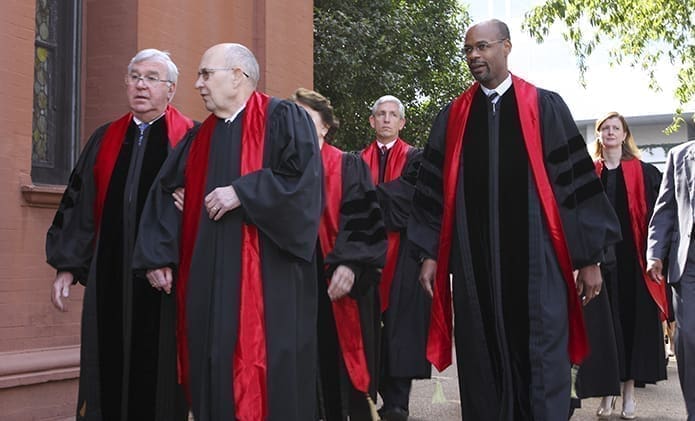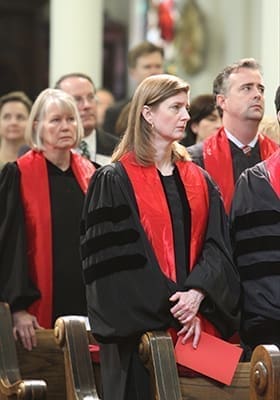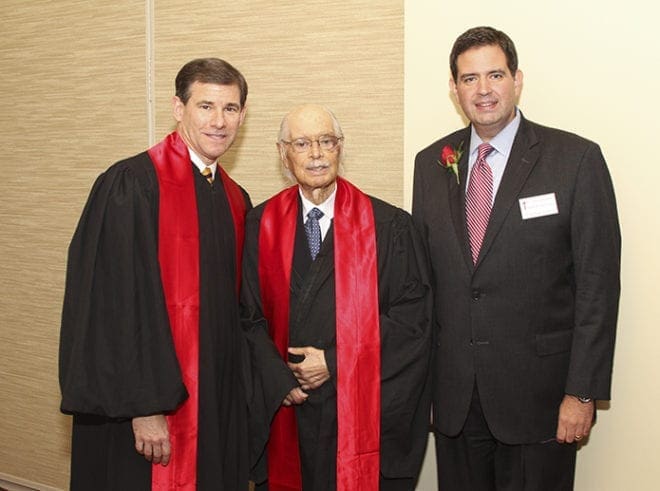 Photo By Michael Alexander
Photo By Michael AlexanderAtlanta
Judge Ward, Pryor honored by Catholic legal society
By NICHOLE GOLDEN, Staff Writer | Published October 16, 2014
ATLANTA—In a tradition dating back more than 750 years, judges, lawyers and those who work alongside them assembled for the annual Red Mass, sponsored by Atlanta’s St. Thomas More Society Oct. 9 at the Basilica of the Sacred Heart of Jesus.
Archbishop Wilton D. Gregory, principal celebrant, asked God’s gracious blessings on all engaged in works of justice and its “corollary mercy” in Georgia.
The title of “Your Honor” is conferred on all judges whether deciding momentous national issues or dealing with more personal situations, noted the archbishop.
“For in truth, justice and mercy wear many different robes from her more mundane rulings to those truly towering decisions that can change the very course of public behavior for an entire nation,” said Archbishop Gregory. “In each of her vestures, she impacts human life on either personal or global scales and she causes us to value her wisdom and to marvel at her equanimity.”

Judge Elizabeth L. Branch of the Georgia Court of Appeals, foreground, Judge Doris L. Downs of the Superior Court of Fulton County, background left, and Judge Shawn Bratton of the State Court of Gwinnett County, background right, stand with the congregation during the reading of Gospel. Photo By Michael Alexander
The archbishop prayed that members of the legal community be filled with the graces needed to exercise their offices and serve others with integrity and dedication.
The St. Thomas More Society of Atlanta, a group of Catholic lawyers, has worked to have ecumenical involvement in the Red Mass since its 1995 beginnings. The Rev. Darren Hensley, a deacon at Peachtree Road United Methodist Church and an attorney, and the Rev. Geoffrey A. Grubbs, senior associate pastor of Northside United Methodist Church, served as lectors for Mass.
Judge Christopher McFadden is one of two Catholics serving on the Court of Appeals of Georgia. He attends Mass at both Sacred Heart Church in Griffin and St. Thomas More Church in Decatur.
“It is an ancient tradition,” said McFadden. “The Atlanta Red Mass is intended to mark the beginning of the September term.”
As a frequent lector, the judge mentioned the Book of Amos and its messages regarding justice.
“There is an awful lot in Scripture on how judges are supposed to act,” said McFadden.
The Red Mass first began centuries ago in Europe, and its name refers to the scarlet robes of the judges who attend, as well as the color of the priests’ vestments.
The Atlanta Brass Society and the St. Thomas More Schola provided the music for the liturgy.
The local celebration of the Red Mass is always followed by a luncheon program and announcement of the recipients of the St. Thomas More Award.
The St. Thomas More Award is presented annually to one or more judges or lawyers recognizing a commitment to “justice and humanity, especially in difficult circumstances.”
The award is given without regard to the political or religious affiliations of the recipients.
This year’s honorees are retired federal judge Horace T. Ward, former senior judge of the U.S. District Court for the Northern District of Georgia, and Judge William H. Pryor Jr., circuit judge of the U.S. Court of Appeals for the 11th Circuit in Birmingham, Ala.
Ward, who retired in 2012 after an historic legal career, was a litigant against the once racially discriminatory practices of the University of Georgia. He also served as an attorney for those who were ultimately successful in that challenge.
Ward was born and raised in LaGrange. He was valedictorian of his class at East Depot Street High School in 1946. He is a graduate of Morehouse College and Atlanta University. After graduating with a master’s degree from Atlanta University, Ward had an interest in studying law. He wanted to attend law school at UGA. However, in 1950 the school of law had never admitted an African-American to its program. Ward’s application was rejected.
In 1952, Ward filed a lawsuit against the university in U.S. District Court in Atlanta. After almost six years of delay, including two years when he served in the U.S. Army in Korea, Ward had his case heard, but dismissed.
While the case was pending, Northwestern University School of Law admitted Ward as a student. He graduated in 1959, returned to Georgia, and joined the law firm that would become Hollowell, Ward, Moore and Alexander.
While Ward’s lawsuit was not successful, his case laid the groundwork for the desegregation of the University of Georgia. Ward was a part of the legal team that led the effort for Hamilton Holmes and Charlayne Hunter-Gault to gain admission to the University of Georgia in 1961 and desegregate the university.

(L-r) St. Thomas More Award recipients, the Honorable William H. Pryor Jr. from the United States Court of Appeals for the Eleventh Circuit, and the Honorable Horace Ward from the United States District Court for the northern district of Georgia, join St. Thomas More Society board of directors member, Brent Herrin, for a photo prior to the Oct. 9 Red Mass.
Ward served five terms in the state Senate. In 1974, Gov. Jimmy Carter appointed him to the Fulton County State Court, making him the first African-American trial court judge in Georgia. In 1977, he became the first African-American to serve on the Fulton County Superior Court. In 1979, President Carter nominated Ward for a vacancy on the U.S. District Court for the Northern District of Georgia, the same court that dismissed his case against UGA. Ward was the first African-American to serve as a federal judge in Georgia. He served as a U.S. district judge for 33 years before retiring.
The University of Georgia School of Law recently awarded Ward an honorary doctor of laws degree.
The second honoree, Judge Pryor served as attorney general of Alabama from 1997 to 2004 when he became a circuit judge for the U.S. Court of Appeals for the 11th Circuit.
During his career, Pryor has been a champion of liberty and civil rights. As attorney general, Pryor led the fight to eliminate a stain on Alabama’s Constitution by proposing removal of the constitutional prohibition of interracial marriage. He was a stanch supporter of a bill designating cross burning as a felony under state law. He also oversaw successful prosecution of two former members of the Ku Klux Klan for the 1963 bombing of the 16th Street Baptist Church in Birmingham.
Pryor had taken the position that the display of the Ten Commandments in a courthouse was appropriate and did not violate the Constitution. However, when then Alabama Chief Justice Roy Moore refused to remove a monument of the commandments from the rotunda of the state’s judicial building after a federal district court judge ordered removal, Pryor upheld the rule of law. Recognizing that everyone must follow lawfully issued court orders, including judges, Pryor successfully prosecuted the case for the removal of Moore from the bench.
After the case, Pryor said, “At the end of the day, when the courts resolve these controversies, we respect their decision. That does not mean that we always agree with their decision.”
A Catholic, Pryor is the founder of Mentor Alabama, which provides positive role models for thousands of at-risk children. He has served as a reading tutor to at-risk children in public schools.
Pryor has continued his work on sentencing reform as a member of the U.S. Sentencing Commission. He is an advocate for alternative court programs, including drug courts for first time non-violent offenders.
Brent Herrin, Red Mass coordinator and a member of the society’s board of directors, said more than 40 judges and 200 other participants attended this year’s Mass and judicial luncheon. Herrin praised the honorees for their firmness of purpose.
“During his life, Judge Ward has persevered over institutional racism and exemplified the principle of equality under the law. Judge Pryor has been a courageous champion to the rule of law during his career. Both of them, through their actions, exemplify the example of St. Thomas More.”